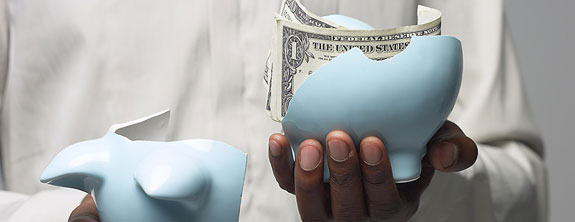The writer and cartoonist Allen Saunders once said, “Life is what happens to us while we are making other plans.”
Personal finance is a perfect example. You can sit down and make a budget that covers all your regular expenses right down to the last cent. But real life has a way of getting in the way. Your water heater bursts, or a taxi sideswipes your car, or your puppy swallows a rubber band, and all of a sudden, your budget is out the window.
There’s no way to predict when disasters like these will strike – but there are ways to prepare for them. For example, you can start that emergency fund we spoke about earlier to cover unexpected expenses. You can also carry insurance to protect you from many problems that could bankrupt you otherwise, such as medical emergencies or car accidents. With a little planning, you can be ready not just for a rainy day, but for a perfect storm of unexpected expenses.

What is an Unexpected Expense?
First, it’s important to understand what an unexpected expense is – and what it’s not. There are some bills you don’t have to pay every month, but these still don’t count as unexpected. Examples include:
- Quarterly property taxes or water/sewer bills
- A vehicle insurance premium that is due every six months
- Yearly eye tests
Expenses like these are predictable. You know exactly when they’re going to come due, and you know approximately how much they’re going to cost. This makes it easy to plan ahead for them in your regular household budget. You just divide that quarterly tax payment by three, the insurance premium by six, or the doctor’s bill by 12, and set aside that amount each month to cover the cost.
Regular car and home maintenance expenses aren’t exactly unexpected, either. These are costs that you know are bound to crop up eventually. You don’t know exactly how much you’re going to have to spend on your car or your home each year, but you can come up with a pretty good estimate.
For instance, for home maintenance, many experts suggest going by the 1% rule: On average, you should expect to spend 1% of your home’s total sale price on maintenance each year. That means if your home cost R1,200,000, you should expect to pay an average of R12,000 a year to maintain it. Thus, if you set aside R1,000,00 each month in your budget for home repairs, over the long term, it should be enough to cover the cost. That way you will keep it in tip-top condition and reduce the possibility of unexpected payments. These amounts form part of your NEEDS (50%) category of expenses.
A truly unexpected expense is something that you can’t predict, such as a natural disaster or a medical emergency. These are the things that could happen to you at any time, but you can never be sure if they will – or how much they’ll cost you if they do. That means you can’t simply fit these expenses into your regular budget; it takes a different kind of planning to prepare for them.
How you deal with an unexpected expense depends on what kind of expense it is. For some, you can buy insurance to protect you from the cost. If insurance doesn’t cover everything, you can try to cut the cost by shopping around – or by using your DIY skills instead of hiring a professional. Then, when you’ve exhausted these options, you can rely on your emergency fund to cover the rest of the bill.